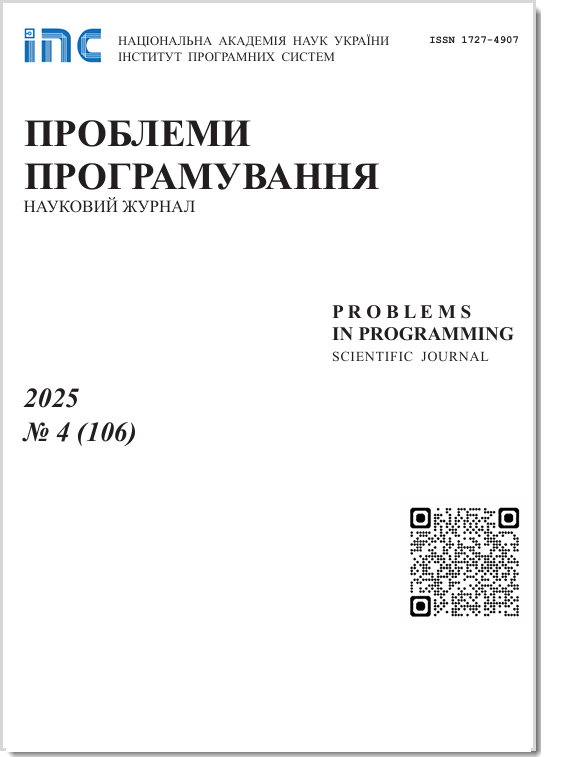Object-component development of changeable software systems
Abstract
Complementary limitations of both Software Product Lines industrial technologies and Lavrischeva – Grishenrko object-component method concerning changeable software development are elicited such as the lack of formalisms for program assets building and ill predictability of this build features.
To cope with the limitations universal Model of Software Family Variant Features is proposed expanding its tradi-tional feature model for basic development artifacts. For assets being considered as reusable Components final Changeable Software Object-Component Model is elaborated including the universal model above being adjusted as Software Variability Object-Component Model. The Algebra is depicted for the operations of both the Components configuring and data types transforming over their interaction within changeable software system.
These operations are proposed to incorporate into the target process for Changeable Software Family proactive and informed Variability management being represented with its technological chart. The process proposed composes the functions for variability Planning, Implementing and Control as well as Family model/consist Evolving up to the Control results. The functions listed are performed within common information environment structured accordingly to Variant Features Model or its object-component adjustment.
Trial software tool for configuring Components in the above process is probed. The usage is depicted of both the framework proposed and this tool over technological lines being implemented in Software Systems Institute of NAS of Ukraine Instrumental-technological complex for changeable software configuring from the components.
Problems in programming 2016; 1: 03-16
Keywords
Full Text:
PDF (Русский)References
Product Line Engineering [Electronic resourse]. – Mode of access: http://www.product lineengineering.com/.
Pohl K., Bockle G., Linden F.J. Software Product Line Engineering: Foundations, Principles and Techniques. - New York: Springer-Verlag, 2005. - 437 p. CrossRef
Czarnecki K., Eisenecker U. Generative Programming: Methods, Tools, and Applications. - Addison-Wesley, Reading, MA, USA, 2000 - 864 p.
Lavrischeva E.M. Рaradigms of programming assembling type in software engeneering // Problems in Programming, 2014. - N 2-3. - P. 121-132. (in Russian).
Lavrischeva E.M., Grischenko V.N. Assembly Programming. Basics of Software Industry. - Kyiv: Naukova Dumka, 2009 (2nd ed.). - 372 p. (in Russian).
Lavrischeva E.M., Grischenko V.N. Interconnection of Multilingual Modules in OS ES. - М.: Finansy i Statystika, 1982. - 127 p.
Lavrischeva K. M. Theory and practice of software factories // In: Cybernetics and Systems Analysis, 2011. - Vol. 47. - N 6. - P. 961-972 CrossRef
Lavrishcheva E.M. Grishchenko V.N. Methods and Tools of Component Programming // Cybernetics and Systems Analysis. - 2003. - Vol. 39. - № 1. - P. 33-45. (in Russian). CrossRef
Grischenko V.N. Theoretical and Applied aspects of Component Programming: Ph. D. theses: spec. 01.05.03; V.M. Glushkov Institute of Cybernetics. - К., 2007. - 34 p. (in Russian).
Lavrishcheva E., Stenyashin A., Kolesnyk A. Object-Component Design. Theoretical and Applied Issues // Visn. Ser. Fiz.-Mat. Nayky, Kyiv St. Univ. im. Tarasa Shevchenka. Special Issue, 2013. - № 4. - С. 150-162. (in Russian).
Lavrischeva K., Stenyashin A., Kolesnyk A. Object-Component Development of Application and Systems. Theory and Practice [Electronic resourse] // Journal of Software Engineering and Applications, 2014. CrossRef
Lavrischeva K., Stenyashin A. An approach for Standard ISO/IEC 11404 General Data Types transformation for use in heterogeneous environments // Second Int. Conf. on High Performance Computing-2012. – К.: КPI, 2012. – P. 227–234. (in Ukrainian).
Lavrischeva K., Slabospitskaya O., Kolesnik A. at all. The Theoretical View for Software Family Variability Management // Visn., Ser. Fiz.-Mat. Nayky, Kyiv Univ. im. Tarasa Shevchenka. – 2011. – N 1. – P. 45–53. (in Ukrainian).
Kolesnik A.L. Models and Methods for Variable Software Systems Familly Development: Ph. D. theses: Kyiv St. Univ. im. Tarasa Shevchenka. – 2013. – 22 p. (in Ukrainian).
Lavrischeva K., Slabospickaya O. An approach for Software Product Family Object-Component Model Elaborating // Problems in Programming. – 2013. – N 3. – P. 14–24. (in Ukrainian).
Slabospickaya O. Feature Model of Software Product Line Enhancing to Enable Product Adaptability [in Ukrainian] // In: Bulletin of University of Kiev. Series: Physics & Mathematics, special issue, Kiev. – 2014. – P. 151–158. (in Ukrainian).
Lavrischeva K., Kolesnik A. Conceptual Models for Distributed Software Systems // Problems in Programming, 2013. – N 1. – P. 21–33. (in Ukrainian).
Lavrischeva K., Aronov A., Dzubenko A. Programs Factory – A conсeption of Knowledge Reprezentation of Scientifical Artifacts From Standpoint of Software Engineering // Comp. and Inf. Sci., Canadian Center of Sci. and Edu. – 2013. – P. 21–28.
Kolesnik A. Approaches for Configuring Reusable Components // Problems in Programming. – 2011. – N 4. – P. 57–66. (in Ukrainian).
Kolesnyk A., Slabospitskaya O. Tested Ap-proach for Variability Management Enhanc-ing in Software Product Line // Proc. 8-th Int. Conf. ICTERI 2012, Kherson, Ukraine, June 6–10, 2012, CEUR-WS.org/Vol-848, urn:nbn:de:0074-848-8. – P. 125–133. [Electronic resource].
Lavrischeva E.M. Software Engineering for Computer Systems. Paradigms, Technologies, CASE tools for Programming. – Kiev: Nau-kova Dumka, 2014.– 284 p. (in Russian).
Lavrischeva K.M., Zinkovich V.M., Kolesnik A.L. Instrumental-Technological Complex for Software Development and Production Scills Learning. A Certificate for authors’ intellectual property N 45292 at 27.08.2012 // State Intellectual Property Service of Ukraine. – Kyiv, 2012.
DOI: https://doi.org/10.15407/pp2016.01.003
Refbacks
- There are currently no refbacks.









